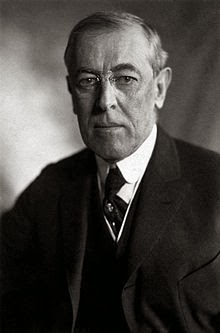The Meaning of a Liberal Education
The following excerpt from a speech delivered by former President Woodrow Wilson to the the N.Y. City High School Teachers Association, 1/9/1909, is important. If you have time to read this speech in its entirety, do so. President Wilson said:
Let us go back and distinguish between the two things that we want to do; for we want to do two things in modern society. We want one class of persons to have a liberal education, and we want another class of persons, a very much larger class, of necessity, in every society, to forego the privileges of a liberal education and fit themselves to perform specific difficult manual tasks. You cannot train them for both in the time that you have at your disposal. They must make a selection, and you must make a selection. I do not mean to say that in the manual training there must not be an element of liberal training; neither am I hostile to the idea that in the liberal education there should be an element of the manual training. But what I am intent upon is that we should not confuse ourselves with regard to what we are trying to make of the pupils under our instruction. We are either trying to make liberally-educated persons out of them, or we are trying to make skillful servants of society along mechanical lines, or else we do not know what we are trying to do. [source]
 |
| President Woodrow Wilson |
Then recall this quotation from 1913:
JOHN D. ROCKEFELLER, JR.’S DIRECTOR OF CHARITY FOR THE ROCKEFELLER FOUNDATION, Frederick T. Gates, set up the Southern Education Board (SEB), which was later incorporated into the General Education Board (GEB) in 1913, setting in motion “the deliberate dumbing down of America.” The Country School of Tomorrow: Occasional Papers No. 1 (General Education Board: New York, 1913) written by Frederick T. Gates contained a section entitled “A Vision of the Remedy” in which he wrote the following:
Is there aught of remedy for this neglect of rural life? Let us, at least, yield ourselves to the gratifications of a beautiful dream that there is. In our dream, we have limitless resources, and the people yield themselves with perfect docility to our molding hand. The present educational conventions fade from our minds; and, unhampered by tradition, we work our own good will upon a grateful and responsive rural folk. We shall not try to make these people or any of their children into philosophers or men of learning or of science.We are not to raise up from among them authors, orators, poets, or men of letters. We shall not search for embryo great artists, painters, musicians. Nor will we cherish even the humbler ambition to raise up from among them lawyers, doctors, preachers, politicians, statesmen, of whom we now have ample supply.